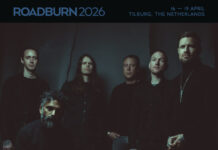Danish progressive black metal enigma (0) lifts the veil for their debut album, “SkamHan,” which was released on 24 April 2020 via Napalm Records. We had the opportunity to discuss all things “SkamHan” with singer FJ and guitarist MA. Read the complete interview here.

Hi there! First of all, thanks for taking the time to do this interview. How are you guys doing?
MA: Great, thank you. Enjoying the weather at the moment.
FJ: Pretty good, I guess you are in the same situation in Finland as we are in Denmark because of the lockdown.
Yeah, exactly. I don’t know how strict they are in there, but are you somehow holding up? Are you keeping yourself somewhat busy?
FJ: Band-wise it’s difficult, of course, because we can’t really meet.
MA: The band is pretty much on a standstill right now.
I noticed that you had to cancel your album release show; are you trying to come up with an alternative or are you going to see what happens and wait out before planning?
MA: I think we are gonna reschedule because we can’t really do anything else.
FJ: No exactly, it’s too early for us to really say what we are going to do. We don’t know when it will be allowed to again to hold concerts, so right now we’re just waiting things out.
I only got acquainted with your band through Napalm Records and I was somewhat intrigued by your name. How is it that you pronounce that?
MA: Well, you can basically pronounce it however you like. It’s not really a name, it’s a symbol (laughs).
I also had a hard time finding out more about your band. What is your story, how did you guys form the band?
FJ: We formed over a course of a few years. We started playing together. We released an EP, then all of a sudden that EP got some traction. It was just three of us back then, me and two guitarists and at some point, we thought we really needed some people to play shows because apparently we have to do that! (laughs)
You’re also an anonymous band; why did you make the decision to be anonymous and how hard is it these days to keep that anonymity intact?
FJ: We don’t really try to do that… The anonymity part isn’t something that we have consciously tried to do, it’s something that has been there. We have been labeled as anonymous because we don’t really show our faces or anything, but it’s not that we wear masks or anything on stage.
MA: It’s actually surprisingly easy to be anonymous because we just don’t talk about ourselves and we don’t post pictures of ourselves on social media. That’s basically it.
FJ: Yeah, and all of a sudden we are labeled anonymous. So, it’s basically pretty easy (laughs).
So it’s not like you guys disguise yourselves during shows. You’re still yourself. It’s just that people don’t really know your real names and all that?
FJ: Yeah, I guess, the idea comes from ourselves talking about keeping the music central. You could say that posting pictures of us on social media doesn’t really have anything to do with the music.
MA: Yeah, it takes away focus from the music. We don’t want to focus on ourselves, that’s the idea behind it. We don’t want people to focus on us or everything around the music, just focus on the music and that’s it.
When you listen to music in general, is the listening experience more important to you than what band is playing?
MA: I think that today there’s a lot of focus on a lot of stuff around bands and not as much maybe on the music they create. We want to make sure that the focus is on the music, but funnily enough, the focus has become the anonymity and the mystery around it, so it’s a paradox. (laughs)

You’re releasing your debut album “SkamHan” on 24 April 2020. What can you tell people about the sound?
FJ: Well, I guess that it’s a sound that started during the creation of the EP and then we built on that sound into something that we think is us. Somehow we know how we want the music to sound, it’s not like we have a recipe for it as such, but we want the sound to be warm and dark at the same time.
Your music by itself is complex and progressive; how do you usually compose the songs? Do you guys start with jamming?
FJ: Sometimes the lyrics are written before the tracks are there since the lyrics are composed of poems; sometimes you just need to bring an overlaying track to it. I think some of the riffs are super old and they just have to be worked into the sound that we have. Some of it is old, some of it we jam through to find the correct sound and cohesiveness with the rest of the tracks or track that we are working on.
You mentioned that the lyrics are poems, are they important for you guys general? Is that what people should be focusing on?
FJ: Yeah, definitely.
Unfortunately, I believe that your lyrics are mostly in Danish; could you maybe explain what sorts of themes are present or are there certain stories or is it more like a stream of consciousness?
FJ: Yeah, well we try to somehow express different emotions and what we go through when experiencing these emotions, and the expression is based on personal experience. If you try to experience a feeling like guilt or envy, you know that those feelings can be very dualistic. When we are dealing with a dualistic feeling, we try to create a track that conveys that somehow. So they are personal lyrics.
Are they thematically connected? Would you say this is a concept album?
MA: I don’t know. I’ve never really thought of it as a concept album. It’s more of a journey through loss or a dark place you’re going through and you just need to work your way through it. That’s basically what the album is about because you have some songs that are kind of violent, kind of primitive in their expressions and then you have some more complex songs with some more complex compositions and such. It all adds to the journey because you have to work through those feelings at some point. We try to convey that journey through dark places which is, for example, why the last track is more ambient. Because it’s meant as the journey’s end and the fade.
That makes sense. Considering it’s a journey, would you say it’s important that you listen to the album from front to back because in these times singles have been more and more popular and people don’t really listen to complete albums anymore?
FJ: I think you can listen to the tracks individually without missing the point, but the last track is definitely like the end of the album and of the story that we are telling. I don’t think you necessarily have to listen to the album in one specific order.
MA: No, not really no.
What I actually really enjoyed was the order of the tracks. It has a really nice flow to it. How did you decide on which song goes in what order, except for the last one then?
MA: (laughs) That was actually pretty difficult because you know, as we are releasing the album on vinyl, there were some restrictions because there has to be a side A and a side B, and they had to be more or less similar in length. I guess that we ended up with some kind of compromise about how the order should be because I don’t think that if we were not restricted by the two sides of the vinyl we would probably have had a little different order. But I think it works pretty well because we have some more slow and complex tracks, we didn’t want them to be next to each other because we thought it would ruin the flow of the album.
Well, I think you pretty much succeeded. I personally wouldn’t have noticed that you would have wanted them in another order. Speaking of the album, it’s called “SkamHam.” My Danish, unfortunately, is not that good. What does the title of the album mean?
FJ: It’s not really a regular Danish word so we wouldn’t blame you at all (laughs). “SkamHan” is a state of mind really. It consists of two words, it’s the word “Skam” which means shame and the word “Han” which is he or male in English, so a translation could be “ShameMale,” but as I mentioned, it is kind of a state of mind.
How did you come about the word and why did you pick it as a title?
FJ: It’s also a title of one of the tracks on the album. It’s been around for a while and I don’t remember how we came up with the title actually. We like to play with words and one day we were talking during rehearsals and came up with it and decided it’s a good title.
MA: Yeah, it kind of summarizes the album in a way, because “SkamHan” as a word is a loaded word because it conveys a dark place to be in with yourself.
FJ: Yeah, and self-blaming also, which is a part of the theme of the album as well.
You guys mentioned the lyrics are poems, you play with words and stuff like that; would you say literature is a big influence for you guys or not so much?
MA: Yeah, it is.
FJ: Yeah, I agree.
Where do you find your inspiration then?
MA: The art just complements the music, that’s the whole idea. The idea of the album is not to convey inspirations. It’s an entity of its own, that’s what we try to do anyway. We made it so that the lyrics complement the music, the artwork complements everything.
FJ: I can’t really answer in another way I guess.
That reminds me of the production. It fits very well with the visual side of the band as it feels kind of raw. Was that a conscious choice?
FJ: It’s a deliberate choice to have the raw sound. We recorded the album in Copenhagen and it’s produced by Wolf Rider Sound Production. We wanted to keep the raw sound from the EP.
MA: The sound again complements everything else.

You also mentioned the cover art briefly. Who made that and what is the story behind it?
MA: It’s a photographer whose work evolves around polaroid photos, which she then places in water for a couple of months so they start to deteriorate and degrade. The pictures she takes are everyday situations basically.
FJ: So, it’s a pretty organic format, that’s what we liked about it too.
So pretty much like your music actually. It really fits together, as you said.
MA: We think that the cover art for the album, you can’t really figure it out, so it makes you think and that’s the point of it actually. The same goes for our music. People will interpret the cover in many different ways.
I assume it is important but do you spend a lot of time thinking about aesthetics and the visual side of the band?
FJ: A lot of time goes into making everything work together (laughs).
MA: We talk a lot in the band. Everything is discussed and so there’s a lot of thought in the things we do.
Do you have like a democratic band, does everyone’s opinion count (laughs)?
MA: No, no one, we have a chief and then the rest of us sit down and bow our heads
Both: (laughter)
MA: I think it probably depends on who you ask, but it’s pretty democratic, we are very open to all ideas, but we also take the liberty to say if we don’t like an idea.
FJ: Of course, we have to sort things out right away because if we didn’t then it would be a mish-mash of everything. For example, we have a track and we have the lyrics down and we try and write the music for it, there’s this super cool riff or drum section or something like that and it doesn’t really fit the music, but it’s super cool, we have to sort that out because it doesn’t fit the track we are working on. We might end up using it somewhere else, on another track but if it’s not right for what we’re writing we won’t use it. Usually, when we talk about it – and we talk a lot about it – you kind of get the people, the guy or the guys who have written this they kind of agree that we don’t need this here and we can’t use this here, you know.
So it’s not always a struggle, there’s not that many fights or anything.
MA: Well it has to if everything has to work, people have to talk.
What are your further plans? Obviously it’s a bit uncertain, but do you have anything else coming up, or are you trying to write new music instead?
MA: I’m always jamming. There’s not really a plan right now, we just have to wait until this blows over before we actually can do something concrete.
FJ: I can imagine that we can start working on new material very soon. At some point, we can start meeting again for rehearsals but we have no shows to practice for, so I think we’ll probably start on new material soon.
How much does it affect you as a band that you can’t play these shows anymore?
FJ: As a band, of course, it’s so annoying we can’t play our release show and we had some pretty cool gigs lined up in the pre-summer also. It’s really annoying, but we talked about this in the band and we think that there are more important matters going on than a small Danish band not being able to play anywhere, so yeah, it’s annoying but we don’t think it’s important.
Imagine this has blown over – why should people come to see your show? What kind of show can you promise them?
MA: Well, we can promise them a lot of good music.
FJ: Yeah, for starters. When we write music we want to take the listener on a journey and it’s the same thing when we play a show, we want the audience to be a part of that journey when we are playing. They should come and check us out for a full experience.
The way I imagine it, your type of music also allows you to do more improvisation on stage for example; do you play around with the music live or strictly hold on to the studio versions of the album?
MA: We stick pretty much to the original tracks. I mean some of them evolve a little bit on stage, but it’s not that much.
FJ: We have some noise parts on some tracks which are pretty much different every time because they’re done live, but that’s about it actually. But on the other hand, we don’t really know because we haven’t played the new album live yet, so they might evolve; the EP did a little bit actually.
I think I asked most of my questions, so do you guys have any last thoughts you want to share with the readers?
MA: Stay tuned!
FJ: Stay safe! Check out our music and go out on see us once we’re on the other side of the lockdown, we’re really looking forward to getting out and playing all over YouTube at some point and we want to visit Finland, it’s a beautiful country!
MA: That’s basically it!
Written by Laureline Tilkin





